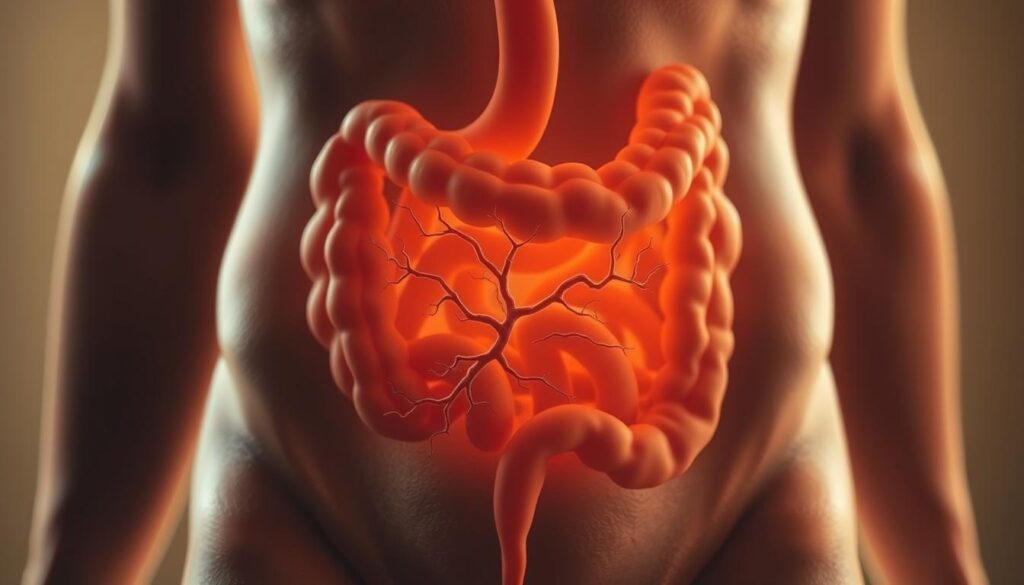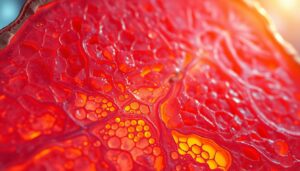Did you know that the appendix, often dismissed as a useless organ, might play a critical role in your gut health? A study analyzing health records of nearly 1.7 million Swedes over 52 years found that those who had their appendix removed had a 20% lower chance of developing Parkinson’s disease1. This suggests the appendix could be more than just a vestigial structure.
Recent research reveals that the appendix acts as a “safe house” for beneficial gut bacteria, especially during gastrointestinal distress2. This discovery challenges the long-held belief that the appendix is merely a source of appendicitis. Instead, it highlights its potential role in maintaining a healthy gut microbiome.
Understanding the appendix’s function could reshape how we view its importance. From immune system support to bacterial diversity, this small organ might hold the key to better digestive health.
Key Takeaways
- The appendix may reduce the risk of Parkinson’s disease by 20%1.
- It acts as a “safe house” for beneficial gut bacteria2.
- Removing the appendix doesn’t show notable ill effects2.
- It harbors diverse bacteria, supporting gut health3.
- Its role in the immune system is still being explored2.
Introduction to Gut Health and the Appendix
Once thought to be a vestigial organ, the appendix is now recognized for its potential health benefits. Historically, it was dismissed as an evolutionary leftover with no significant function. However, modern research from institutions like Duke Medical Center has reshaped this view4.
Universities have played a key role in uncovering the appendix’s true purpose. Studies show it acts as a reservoir for beneficial bacteria, especially during gastrointestinal distress4. This discovery highlights its importance in maintaining a healthy gut microbiome.
Understanding the Historical Perspective
For years, the appendix was considered a useless organ. Early medical texts often labeled it as a remnant of evolution. This belief persisted until recent research revealed its potential role in health and disease4.
As a person interested in health, it’s important to understand this shift in perspective. The appendix isn’t just a source of appendicitis; it may also protect against certain diseases5.
Modern Insights into Gut Microbial Diversity
Today, we know the appendix houses diverse bacteria that support gut health. The immune system plays a crucial role in safeguarding these beneficial microbes4. This dual function—both protective and supportive—makes the appendix more complex than previously thought.
Comparing historical views with modern studies helps us appreciate how far our understanding has come. The appendix is no longer seen as a mere evolutionary leftover but as a vital part of our health4.
Scientific Insights into Appendix Microbiota
Recent studies have uncovered fascinating details about the appendix’s microbial ecosystem. Advanced analysis techniques have revealed a complex and diverse bacterial population within this small organ6. This discovery challenges the idea that the appendix is merely a vestigial structure.
Exploring Microbial Composition and Diversity
The microbial composition in the appendix differs significantly from other parts of the intestine and gastrointestinal tract. Researchers have identified a wide range of bacterial families and genera, including Firmicutes, Bacteroidetes, and Proteobacteria6. These findings highlight the appendix’s role as a microbial reservoir.
Tissue samples from the appendix show higher levels of bacterial diversity compared to other intestinal sites. This diversity plays a crucial role in maintaining gut health, especially during episodes of inflammation or infection7.
Implications from Recent Sequencing Studies
High-throughput sequencing studies have provided detailed insights into the appendix’s microbial ecosystem. These studies show that the appendix houses a unique array of bacteria, which can aid in microbial recovery after gastrointestinal distress6.
For example, the presence of beneficial bacteria like Bifidobacterium and Lactobacillus in the appendix supports gut health. These microbes help restore balance in the digestive system after disruptions7.
| Bacterial Family | Key Genera | Role in Gut Health |
|---|---|---|
| Firmicutes | Clostridium, Lactobacillus | Supports digestion and immune function |
| Bacteroidetes | Bacteroides, Prevotella | Regulates inflammation |
| Proteobacteria | Escherichia, Salmonella | Indicates gut imbalance when overabundant |
These findings emphasize the appendix’s importance in maintaining a healthy gut microbiome. By acting as a “safe house” for beneficial bacteria, it plays a vital role in overall digestive health7.
Beyond Appendicitis: The Surprising Role of Your Appendix in Gut Health
The appendix serves as a protective reservoir for beneficial bacteria. This small organ, often dismissed as unnecessary, plays a vital role in maintaining your gut health. Research shows it acts as a “safe house” for good bacteria, especially during episodes of infection or diarrhea8.

Link Between Appendicitis and Beneficial Bacteria
Appendicitis, an inflammation of the appendix, can disrupt its function as a bacterial reservoir. Studies reveal that the appendix harbors a diverse population of good bacteria, which can help restore gut balance after illness9. This link highlights the organ’s importance beyond just being a source of inflammation.
An appendectomy, the surgical removal of the appendix, might affect your body’s ability to safeguard and redeploy these beneficial microbes. While most people recover well after the procedure, some studies suggest a potential impact on long-term gut health8.
Understanding the “Safe House” Concept
The appendix functions as a protective niche during inflammatory episodes. It shields good bacteria from being flushed out during diarrhea or infection. This “safe house” mechanism ensures that your gut can quickly recover its microbial balance9.
Clinical data shows that a healthy appendix supports a robust gut microbiome. In contrast, an inflamed appendix may lose its ability to act as a reservoir, increasing the risk of microbial imbalance8.
| Condition | Impact on Appendix | Effect on Gut Health |
|---|---|---|
| Healthy Appendix | Acts as a bacterial reservoir | Supports microbial balance |
| Inflamed Appendix | Loses protective function | Increases risk of imbalance |
These findings emphasize the appendix’s role in maintaining your body’s overall microbial health. By understanding its function, you can better appreciate its contribution to digestive well-being9.
The Appendix as a “Safe House” for Good Bacteria
Scientists have uncovered a fascinating mechanism in the appendix that safeguards beneficial bacteria. This small organ, often overlooked, plays a critical role in maintaining a healthy gastrointestinal tract. Research shows that the appendix may act as a microbial reservoir, ensuring rapid recovery after disruptions like infections10.

Concept of Biofilms and Microbial Reservoirs
Biofilms are a key part of this protective function. These thin layers of bacteria form a stable environment within the appendix, shielding beneficial microbes from harm. According to leading scientists, biofilms help retain bacteria that are essential for gut health11.
This mechanism is especially important during episodes of gastrointestinal distress. The appendix may serve as a “safe house,” allowing these microbes to repopulate the gut quickly after illness10. This process highlights the organ’s role in preserving overall digestive health.
| Function of Biofilms | Impact on Gut Health |
|---|---|
| Protects beneficial bacteria | Ensures microbial balance |
| Acts as a microbial reservoir | Supports rapid recovery after illness |
| Shields microbes from inflammation | Maintains immune system function |
This science shows how the appendix evolved to protect your digestive system. By acting as a microbial reservoir, it ensures your gut can recover quickly from disruptions11. Understanding this function helps us appreciate the appendix’s role in maintaining health.
Appendix, Immune Function, and Disease Prevention
The appendix plays a key role in your body’s immune defense, a fact often overlooked in discussions about its function. This small organ interacts with your immune system in ways that can influence your overall health12.
One critical process involves the appendix’s lymphoid tissue, which helps mature B lymphocytes and produce immunoglobulin A (IgA) antibodies12. This activity is especially important during early development, when your immune system is still forming.
Immune System Interactions with Appendicular Tissue
Your appendix’s lymphoid tissue peaks between ages 20 to 30, supporting immune responses during this time12. It also produces molecules that guide lymphocytes throughout your body, aiding in the control of antigens like microbes and viruses12.
In some patient cases, high levels of inflammation in the appendix have been linked to the presence of specific bacterial species13. This connection highlights the organ’s role in managing immune reactions and maintaining balance.
Connection to Inflammation and Parkinson’s Disease
Research shows that inflammation in the appendix can influence broader immune and neurological responses. For example, studies suggest that removing the appendix may delay the onset of Parkinson’s disease4.
This evidence points to a protective role for the appendix in disease prevention. By interacting with your immune system, it may help mitigate the development of certain conditions over time4.
- The appendix supports immune function through lymphoid tissue and antibody production12.
- Inflammation in the appendix is linked to specific bacterial species13.
- Removing the appendix may delay Parkinson’s disease onset4.
- Its role in immune interactions can influence long-term health12.
Comparative Analysis: Appendix Versus Gut Microbiota
The appendix and gut microbiota share a complex relationship, yet their microbial populations differ significantly. Research shows that the appendix houses a greater diversity of bacteria compared to stool samples, highlighting its unique role in gut health14.
Differences in Microbial Populations
Studies reveal that the appendix contains a higher level of microbial diversity than the rest of the gastrointestinal tract. This diversity includes key bacterial families like Firmicutes and Bacteroidetes, which play a critical role in maintaining gut balance14.
According to leading authors, the appendix acts as a microbial reservoir, preserving beneficial bacteria during periods of gastrointestinal distress. This factor sets it apart from other parts of the gut15.
Over the years, sequencing studies have provided valuable insights into these differences. Data shows that even when the appendix is removed, some bacterial communities share similarities with the intestinal system14.
| Microbial Feature | Appendix | Gut |
|---|---|---|
| Diversity Level | High | Moderate |
| Key Bacterial Families | Firmicutes, Bacteroidetes | Streptococcus, Veillonella |
| Role in Gut Health | Microbial Reservoir | Digestive Support |
These findings emphasize the appendix’s distinct role in maintaining microbial balance. By understanding these differences, you can better appreciate its contribution to overall gut health15.
Conclusion
Your appendix, often misunderstood, plays a crucial role in your health. This small organ acts as a “safe house” for beneficial bacteria, helping restore balance in your gut after illness16. It also supports your immune system, aiding in disease prevention and overall well-being17.
Research shows that the appendix’s microbial diversity is vital for long-term health. It preserves good bacteria, ensuring your gut can recover quickly from disruptions16. This function highlights its importance beyond just being a source of inflammation.
Understanding the appendix’s role can reshape how we view its value. From supporting your immune system to maintaining gut balance, this organ is more essential than once thought. Keep these insights in mind as science continues to uncover its true significance.
FAQ
What is the primary function of the appendix in your body?
Can removing your appendix affect your gut health?
How does the appendix interact with your immune system?
Is there a link between the appendix and diseases like Parkinson’s?
What role does the appendix play in gut microbial diversity?
Are there differences between the microbiota in the appendix and the rest of the gut?
Can the appendix protect against acute appendicitis?
How does modern science view the appendix’s role in health?
Source Links
- The appendix may have a purpose after all—and it’s not good news – https://bigthink.com/health/appendix-function-parkinsons-disease/
- What does the appendix do? finally an answer! – https://www.news-medical.net/news/2007/10/08/30907.aspx
- Acute appendicitis manifests as two microbiome state types with oral pathogens influencing severity – https://pmc.ncbi.nlm.nih.gov/articles/PMC9879201/
- Diseases of the Appendix – https://link.springer.com/10.1007/978-3-642-13327-5_161
- No genetic causality between appendectomy and gastrointestinal cancers: a Mendelian randomization study and meta-analysis in European population – Scientific Reports – https://www.nature.com/articles/s41598-024-77600-6
- Role of the gut microbiota in defining human health – https://pmc.ncbi.nlm.nih.gov/articles/PMC2881665/
- The Impact of Microbiota on the Gut–Brain Axis: Examining the Complex Interplay and Implications – https://pmc.ncbi.nlm.nih.gov/articles/PMC10455396/
- Childhood appendectomy and subsequent psychiatric illness – https://journals.plos.org/mentalhealth/article?id=10.1371/journal.pmen.0000219
- The burden of the knowledge-to-action gap in acute appendicitis – https://pmc.ncbi.nlm.nih.gov/articles/PMC10709474/
- What the appendix is good for – https://www.snexplores.org/article/what-appendix-good
- Vermiform Appendix and the Potential for Missed Pathologies – https://pmc.ncbi.nlm.nih.gov/articles/PMC9199560/
- What is the function of the human appendix? Did it once have a purpose that has since been lost? – https://www.scientificamerican.com/article/what-is-the-function-of-the-human-appendix-did-it-once-have-a-purpose-that-has-since-been-lost/
- The intestinal microbiome, barrier function, and immune system in inflammatory bowel disease: a tripartite pathophysiological circuit with implications for new therapeutic directions – https://pmc.ncbi.nlm.nih.gov/articles/PMC4913337/
- Oral microbiome: possible harbinger for children’s health – International Journal of Oral Science – https://www.nature.com/articles/s41368-020-0082-x
- 06_22Cov1.indd – https://www.ccjm.org/content/ccjom/89/6/local/complete-issue.pdf
- Frontiers | A concise pathophysiological model of acute appendicitis against the background of the COVID-19 pandemic – https://www.frontiersin.org/journals/pediatrics/articles/10.3389/fped.2022.908524/full
- Appendectomy history is associated with severe disease and colchicine resistance in adult familial Mediterranean fever patients – https://pmc.ncbi.nlm.nih.gov/articles/PMC8569750/




